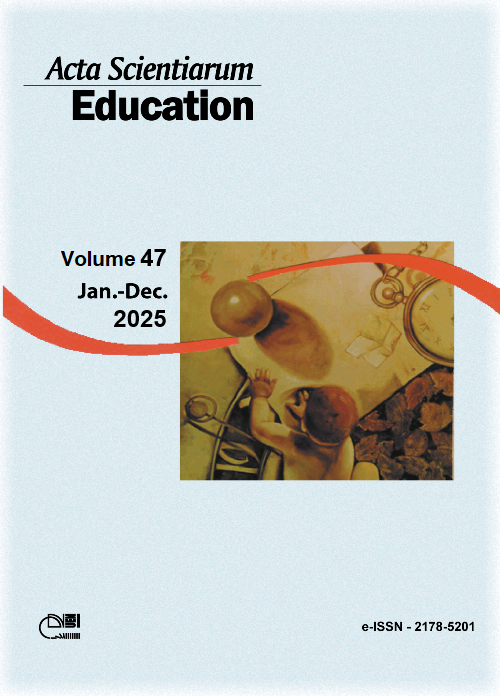Disobedience, insubordination and radicality in research in education
Abstract
I’m using this text to critically reflect on the trajectory of scientific training in different formative itineraries at public universities, especially those in the state of Mato Grosso do Sul. Scientific initiation supervision, supervision of undergraduates, specialization and master’s degree work, research groups, teaching and extension projects, a series of activities that justify the social reason for a university. The occupation of these spaces allowed us to problematize: does science dialogue assertively with subjects from non-moralistic places? Those where the moralistic effects of standardization for being, existing and thinking have not worked? With this problem, I take science as a counter-hegemonic manifesto of the objectified use of subjects of diversity by researchers. As a theoretical-methodological approach, I embrace decolonial, non-normative epistemes, which propose the use of disobedient and non-submissive practices to catalogue different scientific methodologies and practices that go against the effects of normalization without losing focus on the scientific and ethical integrity of research into education and diversity. I then approach the perspectives of female researchers whose social identities distance themselves from the universe of reference predefined by the processes of normalization (white, male, heterosexual, elitist, married, Catholic). I propose to value practices of disobedient, non-submissive and radicalizing subjection, seen as dirty under the gaze of the effects of the cisheteroterrorist patterns of power, in order to contribute to the attempt to build other possibilities for research practices in diversity and education without losing sight of academic and ethical integrity.
Downloads
References
Anzaldúa, G. (2021). A Vulva é uma ferida aberta e outros ensaios. A Bolha.
Butler, J. (2015). Quadros de guerra: quando a vida é passível de luto? Civilização Brasileira.
Chizzotti, A. (2003). A pesquisa qualitativa em ciências humanas e sociais: evolução e desafios. Revista Portuguesa de Educação, 16(2), 221-236.
Dicionário online de Língua Portuguesa. (2024). https://www.dicio.com.br.
Fanon, F. (2008). Pele negra, máscaras brancas. EDUFBA.
Figueiredo, A. (2017). Descolonização do conhecimento no século XXI. In A. R. Santiago, J. C. Carvalho, R. C. S. Barros, & R. S. Silva (Orgs.). Descolonização do conhecimento no contexto afro-brasileiro (pp. 79-106). UFRB.
Hooks, B. (2013). Ensinando a transgredir: educação como prática de liberdade. WMF Martins Fontes.
Maldonado-Torres, N. (2007). Sobre la colonialidade del ser: contribuciones al desarrollo de un concepto. In S. Castro-Gomez, & R. Grosfroguel (Eds.). El giro decolonial: reflexiones para una diversidad epistémica más allá del capitalismo global (pp. 127-168). Siglo del ombres.
Maldonado-Torres, N. (2008). A topologia do ser e geopolítico do conhecimento. Modernidade, império e colonialidade. Revista Crítica de Ciências Sociais, 80(2), 71-114. https://doi.org/10.4000/rccs.695
Maldonado-Torres, N. (2016). Transdisciplinaridade e decolonialidade. Revista Sociedade e Estado, 31(1), 75-97. https://10.1590/S0102-69922016000100005
Maldonado-Torres, N. (2020). Analítica da colonialidade e da decolonialidade: algumas dimensões básicas. In J. Bernardino-Costa, N. Maldonado-Torres, & R. Grosfroguel (Orgs.). Decolonialidade e pensamento afrodiaspórico (pp. 27-54). Autêntica.
Mignolo, W. (2004). Os esplendores e as miséria da “ciência”: colonialidade, geopolítica do conhecimento e pluri-versalidade epistémica. In B. Souza Santos (Ed.), Conhecimento prudente para uma vida decente: um discurso sobre as ciências revisitado (p. 667-707). Cortez.
Mignolo, W. (2008). Desobediência epistêmica: a opção descolonial e o significado de identidade em política. Cadernos de Letras, 34(1), 287-324.
Mignolo, W., & Veiga, I. B. (2021). Desobediência epistêmica, pensamento independente e liberdade decolonial. Revista X, 16(1), 24-53. http://dx.doi.org/10.5380/rvx.v16i1.78142
Nascimento, L. (2022). Prefácio (isso não é um prefácio). In I. Moura, N. Monteiro, R. Peruzzo, & R. Afonso-Rocha. Cutucando o cu do cânone: insubmissões teóricas e desobediências epistêmicas (pp. 7-9). Curitiba.
Oliveira, M. R. G. (2017). O diabo em forma de gente: (r)existências de gays afeminados, viados e bichas pretas na educação [Tese de Doutorado, Universidade Federal do Paraná].
Quijano, A. (2009). Colonialidade do poder e classificação social. In B. Souza Santos, & M. P. Meneses (Orgs.). Epistemologias do sul (pp. 73-118). Cortez.
Rufino, L. (2021). Vence-demanda: educação e descolonização. Mórula.
Silva, F. G. O. (2021). Manifesto-convite para endiabrar as pesquisas em educação a partir de olhares da desobediência epistêmica. In I. Moura, N. Monteiro, R. Peruzzo, & R. Afonso-Rocha. Cutucando o cu do cânone: insubmissões teóricas e desobediências epistêmicas (pp. 263-280). Devires.
Streck, D. R., & Adams, T. (2012). Pesquisas em educação: os movimentos sociais e a reconstrução epistemológica num contexto de decolonialidade. Educação e Pesquisa, 38(1), 243-258. https://doi.org/10.1590/S1517-97022012005000003
Copyright (c) 2025 Fernando Guimarães Oliveira da Silva

This work is licensed under a Creative Commons Attribution 4.0 International License.

This work is licensed under a Creative Commons Attribution 4.0 International License.
DECLARATION OF ORIGINALITY AND COPYRIGHTS
I declare that this article is original and has not been submitted for publication in any other national or international journal, either in part or in its entirety.
The copyright belongs exclusively to the authors. The licensing rights used by the journal are the Creative Commons Attribution 4.0 (CC BY 4.0) license: sharing (copying and distributing the material in any medium or format) and adaptation (remixing, transforming, and building upon the material thus licensed for any purpose, including commercial purposes) are permitted.
It is recommended that you read this link for more information on the subject: providing credits and references correctly, among other crucial details for the proper use of the licensed material.















































